高中英语外研版选修七 Module 3 Literature Period Two Integrating Skills & Cultural Corner课件(共 45 张PPT)
文档属性
| 名称 | 高中英语外研版选修七 Module 3 Literature Period Two Integrating Skills & Cultural Corner课件(共 45 张PPT) | 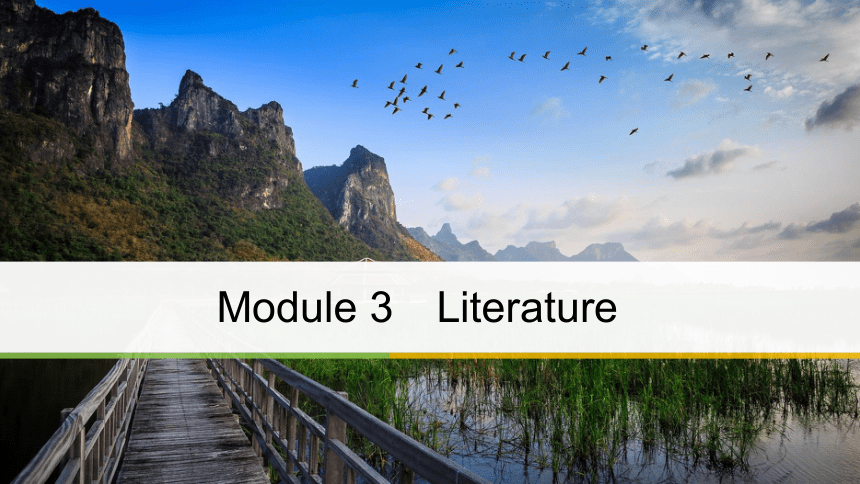 | |
| 格式 | zip | ||
| 文件大小 | 1.9MB | ||
| 资源类型 | 教案 | ||
| 版本资源 | 外研版 | ||
| 科目 | 英语 | ||
| 更新时间 | 2019-03-12 17:00:11 | ||
图片预览

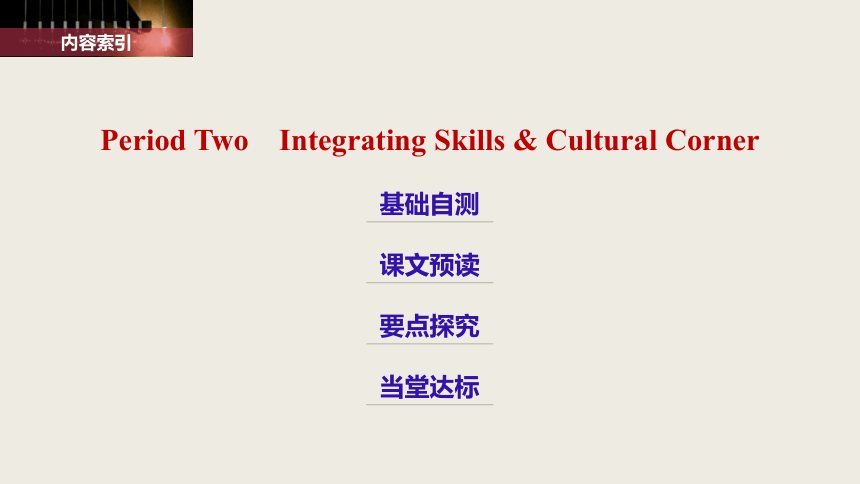

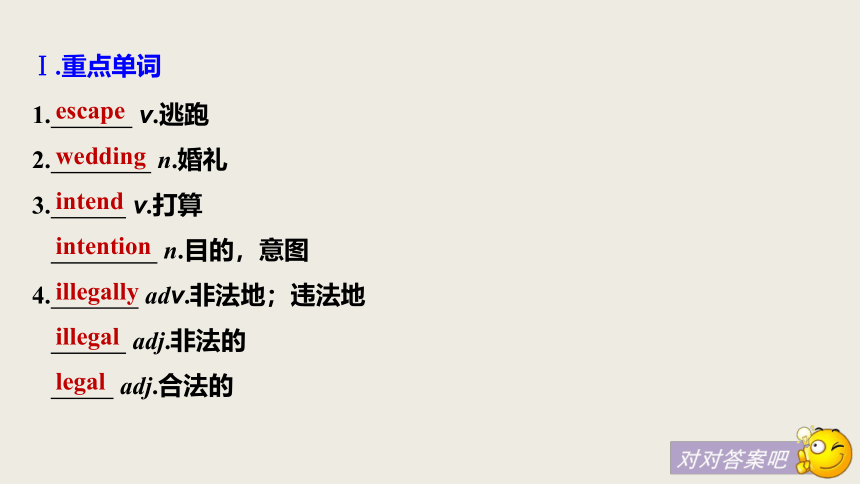
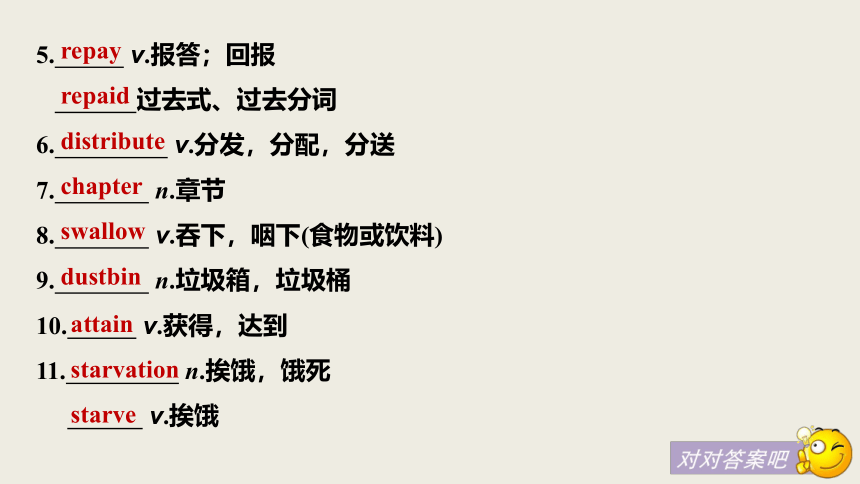
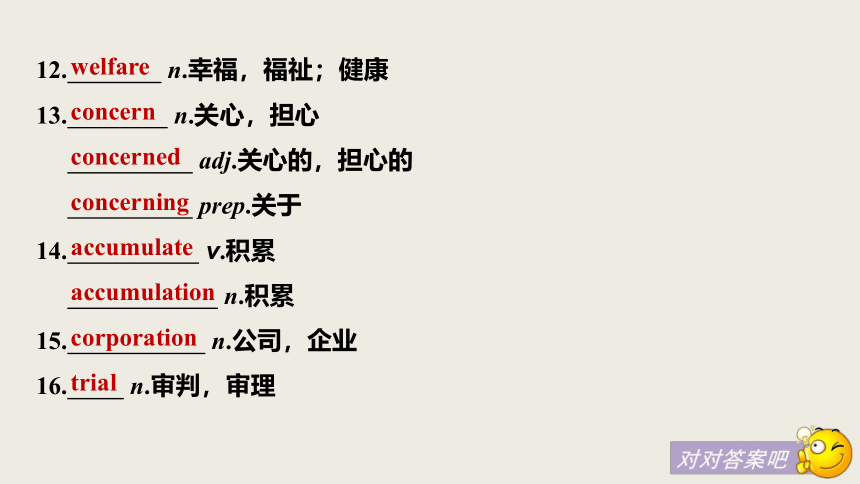

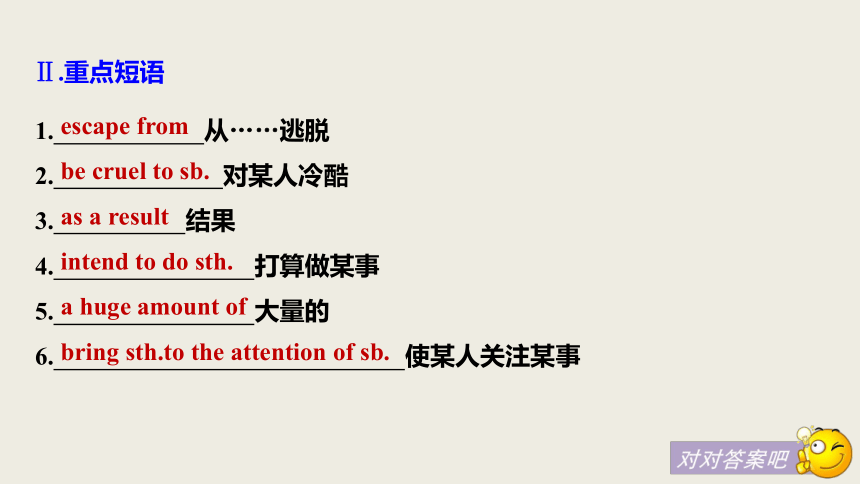
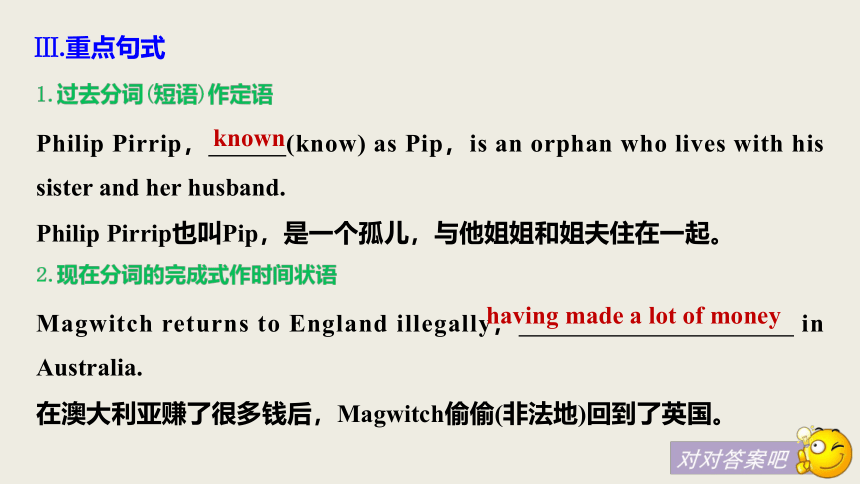
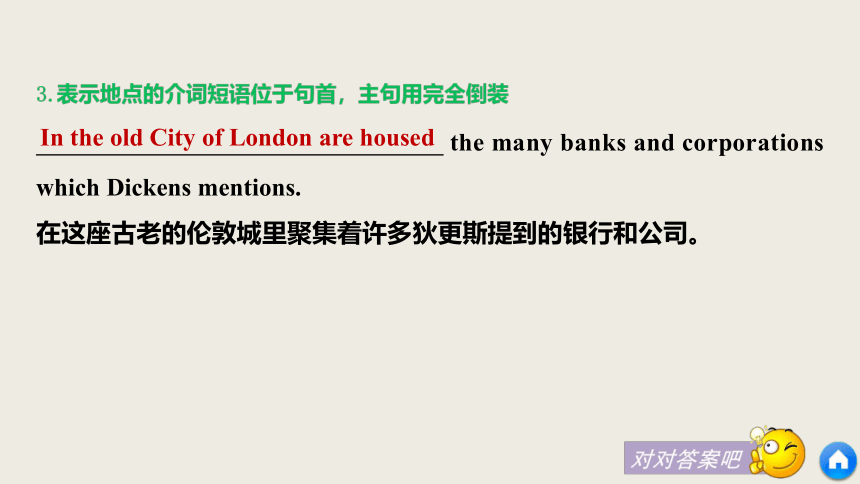

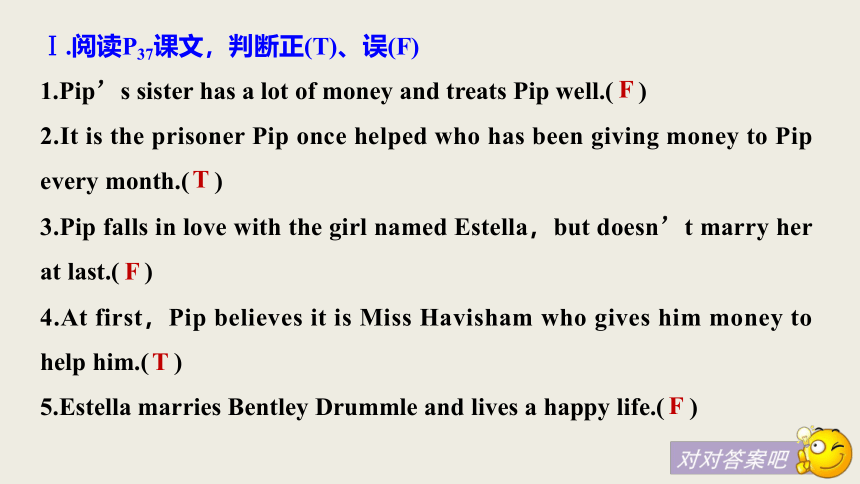
文档简介
课件45张PPT。Module 3 Literature基础自测 当堂达标内容索引课文预读要点探究Period Two Integrating Skills & Cultural Corner基础自测1. v.逃跑
2. n.婚礼
3. v.打算
n.目的,意图
4. adv.非法地;违法地
adj.非法的
adj.合法的Ⅰ.重点单词escape
wedding
intend
intention
illegally
illegal
legal5. v.报答;回报
过去式、过去分词
6. v.分发,分配,分送
7. n.章节
8. v.吞下,咽下(食物或饮料)
9. n.垃圾箱,垃圾桶
10. v.获得,达到
11. n.挨饿,饿死
v.挨饿repay
repaid
distribute
chapter
swallow
dustbinattain
starvation
starve12. n.幸福,福祉;健康
13. n.关心,担心
adj.关心的,担心的
prep.关于
14. v.积累
n.积累
15. n.公司,企业
16. n.审判,审理welfare
concern
concerned
concerning
accumulate
accumulation
corporation
trial17. v.完成(任务等),取得(成功)
n.成就,成绩
18. adj.(身份、地位等)低下的,卑微的
19. n.行人
20. v.悼念,哀悼,为……哀痛accomplish
accomplishment
humble
pedestrian
mournⅡ.重点短语1. 从……逃脱
2. 对某人冷酷
3. 结果
4. 打算做某事
5. 大量的
6. 使某人关注某事escape from
be cruel to sb.
as a result
intend to do sth.
a huge amount of
bring sth.to the attention of sb.Ⅲ.重点句式Philip Pirrip, (know) as Pip,is an orphan who lives with his sister and her husband.
Philip Pirrip也叫Pip,是一个孤儿,与他姐姐和姐夫住在一起。1.过去分词(短语)作定语knownMagwitch returns to England illegally, in Australia.
在澳大利亚赚了很多钱后,Magwitch偷偷(非法地)回到了英国。2.现在分词的完成式作时间状语having made a lot of money the many banks and corporations which Dickens mentions.
在这座古老的伦敦城里聚集着许多狄更斯提到的银行和公司。3.表示地点的介词短语位于句首,主句用完全倒装In the old City of London are housed课文预读Ⅰ.阅读P37课文,判断正(T)、误(F)
1.Pip’s sister has a lot of money and treats Pip well.( )
2.It is the prisoner Pip once helped who has been giving money to Pip every month.( )
3.Pip falls in love with the girl named Estella,but doesn’t marry her at last.( )
4.At first,Pip believes it is Miss Havisham who gives him money to help him.( )
5.Estella marries Bentley Drummle and lives a happy life.( )FTFTFⅡ.阅读P39课文Dickens’ London,回答下列问题
1.What’s the main idea of the passage?
________________________________________________________________________________________.
2.What text type does the passage belong to?
_______________________.It is about Dickens’ cast of characters who lived in London,the largest and richest city in the worldIt belongs to a descriptionⅢ.阅读P41课文Charles Dickens,选择正确答案
1.Why was his father put in prison?
A.Because of murder.
B.Because of debts.
C.Because of stealing.
D.For some other reasons.√答案512342.Where was Charles Dickens born?
A.New York. B.Mississippi.
C.London. D.Paris.1234√答案53.Which of the following statements is NOT true according to the text?
A.Dickens started writing novels in his early thirties.
B.Dickens often wrote about the problems of poor people.
C.David Copperfield is one of his famous novels.
D.Dickens’ books were only popular in England.1234√答案54.When his second novel Oliver Twist was published,Charles Dickens was .
A.in his twenties B.in his thirties
C.in his forties D.in his fifties1234√答案55.We can infer from the text that Charles Dickens .
A.wrote about the problems of poor people
B.helped improve the lives of the poor people
C.used his experiences in his writing
D.was very satisfied with his novel Oliver Twist,especially the final part1234√答案5要点探究(1)escape v.逃跑;被忘掉;被忽视
escape from从……中逃脱
escape (doing) sth.逃脱(做)某事
(2)escape n.逃跑;逃脱
a narrow escape死里逃生,九死一生
Magwitch has escaped from prison but is soon caught again...
Magwitch刚从监狱里逃出来,但不久又被抓住……归纳拓展重点词汇(1)I met one of my old classmates the other day but his name escaped me.
前几天我遇见我的一个老同学,可是我忘记了他的名字。
(2)You were lucky to escape punishment/being punished.
你没有受罚,真幸运。
(3)More than once he had a narrow escape (from) being eaten by sharks in the expedition.
那次探险中,他有好几次差点被鲨鱼吃掉了。语境助记(1)单句语法填空
①I had narrow escape last year and I don’t want to risk my life a second time.
②Little Tom slipped into the classroom quietly,trying to escape _________
(notice) by the teacher.
(2)完成句子
All the guests were able to (从燃烧的旅馆中逃离出来).题组训练abeingnoticedescape from the burning hotel(3)单句改错
We were lucky that we just escaped caught in the storm.∧
beingintend v.打算
intend to do/doing sth.打算做某事
intend sb.to do sth.打算让某人做某事
had intended to do(=intended to have done)本打算做……(但实际没有)
be intended for专供……使用,专为……而设计
Some years later,Pip learns that an unknown person intends to give him money every month.
几年后,皮普得知有一位不知名的人士打算每月资助他。归纳拓展(1)The author intends to tell/telling us that e-waste deserves to be made good use of.
作者意在告诉我们电子垃圾值得被充分利用。
(2)My father intended me to become a doctor.
我父亲想让我当个医生。
(3)This kind of bicycle is intended for people who are too short.
这种自行车是专为身材矮小的人设计的。语境助记(1)单句语法填空
①I (intend) to catch the early train,but I didn’t get up in time.
②The money we are raising is intended the poor boy who was born blind.
(2)句型转换
①The film is intended for children.
The film children.
②I intend to go swimming this afternoon.
I intend swimming this afternoon.题组训练is designed forhad intendedforgoing③I had intended to help you,but I was too busy then.
I intended you,but I was too busy then.
(3)单句改错
Intending for the disabled children,the school is said to be completed by the end of next year.to have helpedIntended
Dickens always had a huge amount of energy.
狄更斯总是精力充沛。a huge amount of大量的
表示“许多;大量的”词组汇总:
(1)a large/great/good number of,a great/good many,a good few/quite a few+可数名词复数;
(2)a great/good deal of,a great/large amount of,quite a little+不可数名词;
(3)a lot of/lots of,a great/large quantity of,large quantities of,plenty of+可数名词复数/不可数名词。
注意:“quantities/amounts+of+名词”作主语时,谓语和quantities或amounts的数保持一致;“a quantity of/an amount of+名词”作主语,谓语与被修饰的名词一致。归纳拓展(1)A large number of people are fond of music.
许多人喜欢音乐。
(2)The government invested a large amount of money on education.
政府在教育上投入了大量的资金。
(3)Quantities of books were sent to the faraway village.
许多书被送到这个遥远的村庄。语境助记(1)用所给动词的正确形式填空
—A number of people (learn) English nowadays.
—Yes.The number of people who are learning English (increase).
(2)句型转换
①I need a great deal of money to buy a new house.
I need money to buy a new house.
②She has made a great many friends since she came here.
She has made friends since she came here.题组训练a good number ofare learningis increasinga great/large amount of(3)单句改错
We always keep a plenty of spare paper,in case we run out.
Magwitch returns to England illegally,having made a lot of money in Australia.
在澳大利亚赚了很多钱后,Magwich偷偷(非法地)回到了英国。经典句式(1)句中having made a lot of money in Australia是现在分词的完成式形式,在句中作时间状语,表示make a lot of money的动作在主句谓语动词return动作之前已完成。
(2)having done是v.-ing形式的完成式,表示的动作发生在谓语动词的动作之前,在句中常作状语,表示时间或原因。归纳拓展(1)Having lived there for years,he got used to the life there.
在那儿生活了几年后,他已经习惯了那里的生活。
(2)Having made great progress in English,he decided to go abroad.
在英语方面取得很大进步后,他决定出国。语境助记完成句子
(1) (工作了两天后),Steve managed to finish his report on schedule.(2015·天津)
(2) (没收到他的来信),she wrote again.
(3)The young man, (曾几次试图打破) the world record in high jump,decided to have another try.题组训练Having worked for two daysNot having received his letterhaving made several attempts to break当堂达标Ⅰ.单词拼写
1.Don’t worry.The hard work that you do now will be (回报) later in life.
2.It was (顽皮的) of you to pull the cat’s tail.
3.He (积累) a lot of experience in finance while working abroad.
4.They had (分发) the lands among the peasants.
5.The problem will appear whether a different (福利) system will be created.distributedrepaidnaughtyaccumulatedwelfare6.It is reported that some Africans died of (饿死).
7.There is growing about teens’ health problems on television.
8.An is a child whose parents are both dead.
9.We should try our best to the task ahead of time.
10.We put the books in on the floor.starvationconcernorphanaccomplishpilesⅡ.选词填空
11.They these facts the leaders.
12.He was captured,trying to the prison.
13.She spent money on that coat.
14.When do you go to London?
15.We shouldn’t animals.brought to the attention ofa huge amount ofescape fromintend tobe cruel toⅢ.完成句子
16.The teacher, (后面跟着他的学生) walked out of the classroom.
17.He did his homework carelessly, (犯了许多错误).
18. (村子附近有) a large factory.
19.It is of (和他争论没有用).
20. (完成工作后),she got ready to go shopping.followed by his studentsmaking a lot of mistakesNear the village isno use arguing with himHaving finished the workⅣ.课文短文改错
Charles Dickens (1812-1870) is born in London.His father was put in the prison because he could not pay his bills.Two days after his 13th birthdays,he started work in a factory,experienced real poverty.∧
andwasbirthdayexperiencing或 experienced real poverty.或 Dickens started write novels in his early thirties and become successful almost immediately.或 The reason which he was able to write well about poverty was that he had really experienced it herself.The reason which he was able to write well about poverty was that he had really experienced it herself.
Dickens started write novels in his early thirties and become successful almost immediately.writing∧
towhyhimselfbecame∧
forOliver Twist,his second novel published in 1838,brought child poverty to the attentions of the public,and was considered a very important novel.Over the next 25 years,Dickens wrote many popular novels about the problems of poor people,which were still widely read today.attentionare本课结束
2. n.婚礼
3. v.打算
n.目的,意图
4. adv.非法地;违法地
adj.非法的
adj.合法的Ⅰ.重点单词escape
wedding
intend
intention
illegally
illegal
legal5. v.报答;回报
过去式、过去分词
6. v.分发,分配,分送
7. n.章节
8. v.吞下,咽下(食物或饮料)
9. n.垃圾箱,垃圾桶
10. v.获得,达到
11. n.挨饿,饿死
v.挨饿repay
repaid
distribute
chapter
swallow
dustbinattain
starvation
starve12. n.幸福,福祉;健康
13. n.关心,担心
adj.关心的,担心的
prep.关于
14. v.积累
n.积累
15. n.公司,企业
16. n.审判,审理welfare
concern
concerned
concerning
accumulate
accumulation
corporation
trial17. v.完成(任务等),取得(成功)
n.成就,成绩
18. adj.(身份、地位等)低下的,卑微的
19. n.行人
20. v.悼念,哀悼,为……哀痛accomplish
accomplishment
humble
pedestrian
mournⅡ.重点短语1. 从……逃脱
2. 对某人冷酷
3. 结果
4. 打算做某事
5. 大量的
6. 使某人关注某事escape from
be cruel to sb.
as a result
intend to do sth.
a huge amount of
bring sth.to the attention of sb.Ⅲ.重点句式Philip Pirrip, (know) as Pip,is an orphan who lives with his sister and her husband.
Philip Pirrip也叫Pip,是一个孤儿,与他姐姐和姐夫住在一起。1.过去分词(短语)作定语knownMagwitch returns to England illegally, in Australia.
在澳大利亚赚了很多钱后,Magwitch偷偷(非法地)回到了英国。2.现在分词的完成式作时间状语having made a lot of money the many banks and corporations which Dickens mentions.
在这座古老的伦敦城里聚集着许多狄更斯提到的银行和公司。3.表示地点的介词短语位于句首,主句用完全倒装In the old City of London are housed课文预读Ⅰ.阅读P37课文,判断正(T)、误(F)
1.Pip’s sister has a lot of money and treats Pip well.( )
2.It is the prisoner Pip once helped who has been giving money to Pip every month.( )
3.Pip falls in love with the girl named Estella,but doesn’t marry her at last.( )
4.At first,Pip believes it is Miss Havisham who gives him money to help him.( )
5.Estella marries Bentley Drummle and lives a happy life.( )FTFTFⅡ.阅读P39课文Dickens’ London,回答下列问题
1.What’s the main idea of the passage?
________________________________________________________________________________________.
2.What text type does the passage belong to?
_______________________.It is about Dickens’ cast of characters who lived in London,the largest and richest city in the worldIt belongs to a descriptionⅢ.阅读P41课文Charles Dickens,选择正确答案
1.Why was his father put in prison?
A.Because of murder.
B.Because of debts.
C.Because of stealing.
D.For some other reasons.√答案512342.Where was Charles Dickens born?
A.New York. B.Mississippi.
C.London. D.Paris.1234√答案53.Which of the following statements is NOT true according to the text?
A.Dickens started writing novels in his early thirties.
B.Dickens often wrote about the problems of poor people.
C.David Copperfield is one of his famous novels.
D.Dickens’ books were only popular in England.1234√答案54.When his second novel Oliver Twist was published,Charles Dickens was .
A.in his twenties B.in his thirties
C.in his forties D.in his fifties1234√答案55.We can infer from the text that Charles Dickens .
A.wrote about the problems of poor people
B.helped improve the lives of the poor people
C.used his experiences in his writing
D.was very satisfied with his novel Oliver Twist,especially the final part1234√答案5要点探究(1)escape v.逃跑;被忘掉;被忽视
escape from从……中逃脱
escape (doing) sth.逃脱(做)某事
(2)escape n.逃跑;逃脱
a narrow escape死里逃生,九死一生
Magwitch has escaped from prison but is soon caught again...
Magwitch刚从监狱里逃出来,但不久又被抓住……归纳拓展重点词汇(1)I met one of my old classmates the other day but his name escaped me.
前几天我遇见我的一个老同学,可是我忘记了他的名字。
(2)You were lucky to escape punishment/being punished.
你没有受罚,真幸运。
(3)More than once he had a narrow escape (from) being eaten by sharks in the expedition.
那次探险中,他有好几次差点被鲨鱼吃掉了。语境助记(1)单句语法填空
①I had narrow escape last year and I don’t want to risk my life a second time.
②Little Tom slipped into the classroom quietly,trying to escape _________
(notice) by the teacher.
(2)完成句子
All the guests were able to (从燃烧的旅馆中逃离出来).题组训练abeingnoticedescape from the burning hotel(3)单句改错
We were lucky that we just escaped caught in the storm.∧
beingintend v.打算
intend to do/doing sth.打算做某事
intend sb.to do sth.打算让某人做某事
had intended to do(=intended to have done)本打算做……(但实际没有)
be intended for专供……使用,专为……而设计
Some years later,Pip learns that an unknown person intends to give him money every month.
几年后,皮普得知有一位不知名的人士打算每月资助他。归纳拓展(1)The author intends to tell/telling us that e-waste deserves to be made good use of.
作者意在告诉我们电子垃圾值得被充分利用。
(2)My father intended me to become a doctor.
我父亲想让我当个医生。
(3)This kind of bicycle is intended for people who are too short.
这种自行车是专为身材矮小的人设计的。语境助记(1)单句语法填空
①I (intend) to catch the early train,but I didn’t get up in time.
②The money we are raising is intended the poor boy who was born blind.
(2)句型转换
①The film is intended for children.
The film children.
②I intend to go swimming this afternoon.
I intend swimming this afternoon.题组训练is designed forhad intendedforgoing③I had intended to help you,but I was too busy then.
I intended you,but I was too busy then.
(3)单句改错
Intending for the disabled children,the school is said to be completed by the end of next year.to have helpedIntended
Dickens always had a huge amount of energy.
狄更斯总是精力充沛。a huge amount of大量的
表示“许多;大量的”词组汇总:
(1)a large/great/good number of,a great/good many,a good few/quite a few+可数名词复数;
(2)a great/good deal of,a great/large amount of,quite a little+不可数名词;
(3)a lot of/lots of,a great/large quantity of,large quantities of,plenty of+可数名词复数/不可数名词。
注意:“quantities/amounts+of+名词”作主语时,谓语和quantities或amounts的数保持一致;“a quantity of/an amount of+名词”作主语,谓语与被修饰的名词一致。归纳拓展(1)A large number of people are fond of music.
许多人喜欢音乐。
(2)The government invested a large amount of money on education.
政府在教育上投入了大量的资金。
(3)Quantities of books were sent to the faraway village.
许多书被送到这个遥远的村庄。语境助记(1)用所给动词的正确形式填空
—A number of people (learn) English nowadays.
—Yes.The number of people who are learning English (increase).
(2)句型转换
①I need a great deal of money to buy a new house.
I need money to buy a new house.
②She has made a great many friends since she came here.
She has made friends since she came here.题组训练a good number ofare learningis increasinga great/large amount of(3)单句改错
We always keep a plenty of spare paper,in case we run out.
Magwitch returns to England illegally,having made a lot of money in Australia.
在澳大利亚赚了很多钱后,Magwich偷偷(非法地)回到了英国。经典句式(1)句中having made a lot of money in Australia是现在分词的完成式形式,在句中作时间状语,表示make a lot of money的动作在主句谓语动词return动作之前已完成。
(2)having done是v.-ing形式的完成式,表示的动作发生在谓语动词的动作之前,在句中常作状语,表示时间或原因。归纳拓展(1)Having lived there for years,he got used to the life there.
在那儿生活了几年后,他已经习惯了那里的生活。
(2)Having made great progress in English,he decided to go abroad.
在英语方面取得很大进步后,他决定出国。语境助记完成句子
(1) (工作了两天后),Steve managed to finish his report on schedule.(2015·天津)
(2) (没收到他的来信),she wrote again.
(3)The young man, (曾几次试图打破) the world record in high jump,decided to have another try.题组训练Having worked for two daysNot having received his letterhaving made several attempts to break当堂达标Ⅰ.单词拼写
1.Don’t worry.The hard work that you do now will be (回报) later in life.
2.It was (顽皮的) of you to pull the cat’s tail.
3.He (积累) a lot of experience in finance while working abroad.
4.They had (分发) the lands among the peasants.
5.The problem will appear whether a different (福利) system will be created.distributedrepaidnaughtyaccumulatedwelfare6.It is reported that some Africans died of (饿死).
7.There is growing about teens’ health problems on television.
8.An is a child whose parents are both dead.
9.We should try our best to the task ahead of time.
10.We put the books in on the floor.starvationconcernorphanaccomplishpilesⅡ.选词填空
11.They these facts the leaders.
12.He was captured,trying to the prison.
13.She spent money on that coat.
14.When do you go to London?
15.We shouldn’t animals.brought to the attention ofa huge amount ofescape fromintend tobe cruel toⅢ.完成句子
16.The teacher, (后面跟着他的学生) walked out of the classroom.
17.He did his homework carelessly, (犯了许多错误).
18. (村子附近有) a large factory.
19.It is of (和他争论没有用).
20. (完成工作后),she got ready to go shopping.followed by his studentsmaking a lot of mistakesNear the village isno use arguing with himHaving finished the workⅣ.课文短文改错
Charles Dickens (1812-1870) is born in London.His father was put in the prison because he could not pay his bills.Two days after his 13th birthdays,he started work in a factory,experienced real poverty.∧
andwasbirthdayexperiencing或 experienced real poverty.或 Dickens started write novels in his early thirties and become successful almost immediately.或 The reason which he was able to write well about poverty was that he had really experienced it herself.The reason which he was able to write well about poverty was that he had really experienced it herself.
Dickens started write novels in his early thirties and become successful almost immediately.writing∧
towhyhimselfbecame∧
forOliver Twist,his second novel published in 1838,brought child poverty to the attentions of the public,and was considered a very important novel.Over the next 25 years,Dickens wrote many popular novels about the problems of poor people,which were still widely read today.attentionare本课结束
